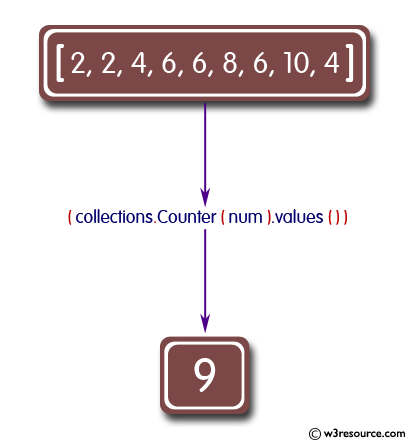Python: Sum of all counts in a collections
Sum Collection Counts
Write a Python program to sum all counts in a collection.
Pictorial Presentation:

Sample Solution-1:
Python Code:
# Import the 'collections' module, which provides the 'Counter' class.
import collections
# Define a list of numbers.
num = [2, 2, 4, 6, 6, 8, 6, 10, 4]
# Use 'collections.Counter' to count the occurrences of each number and sum the values.
# 'collections.Counter' returns a dictionary-like object with elements as keys and their counts as values.
# 'sum(collections.Counter(num).values())' calculates the sum of these counts.
result = sum(collections.Counter(num).values())
# Print the result, which is the sum of the counts.
print(result)
Sample Output:
9
Sample Solution-2:
Python Code:
# Create a list 'nums' containing various integer values.
nums = [2, 2, 4, 6, 6, 8, 6, 10, 4]
# Calculate and print the length (number of elements) of the 'nums' list.
print(len(nums))
Sample Output:
9
For more Practice: Solve these Related Problems:
- Write a Python program to sum all the values in a nested dictionary.
- Write a Python program to count and sum unique elements in a list.
- Write a Python program to sum the occurrences of elements in a dictionary where values are lists.
- Write a Python function that sums up the counts of multiple collections dynamically.
Go to:
Previous: Write a Python program to check if multiple variables have the same value.
Next: Write a Python program to get the actual module object for a given object.
Python Code Editor:
What is the difficulty level of this exercise?
Test your Programming skills with w3resource's quiz.
